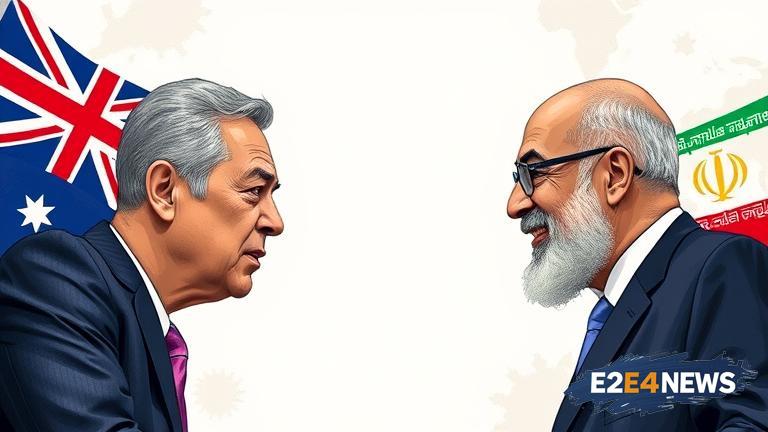In a significant escalation of diplomatic tensions, Australia has expelled the Iranian ambassador from the country. This move comes after Prime Minister Anthony Albanese accused Tehran of directing antisemitic attacks. The decision has been met with widespread support from the Australian Jewish community, who have long been concerned about the rising tide of antisemitism. The Iranian government has denied any involvement in the alleged attacks, but the Australian government remains unconvinced. The expulsion of the ambassador is seen as a strong statement by the Australian government, demonstrating its commitment to combating antisemitism and protecting its Jewish community. The incident has sparked a heated debate about the role of foreign governments in promoting hate speech and violence. The Australian government has faced criticism for not taking stronger action sooner, but the expulsion of the ambassador is seen as a step in the right direction. The Iranian government has been accused of promoting antisemitic rhetoric and supporting extremist groups, which has contributed to the deterioration of relations between the two countries. The Australian Jewish community has welcomed the government’s decision, saying it sends a strong message that antisemitism will not be tolerated. The incident has also sparked concerns about the safety of Jewish communities around the world, with many calling for greater action to be taken to combat hate speech and violence. The United Nations has condemned the alleged attacks, calling for greater tolerance and understanding between nations. The Australian government has faced pressure from other countries to take a stronger stance against Iran, which has been accused of human rights abuses and supporting terrorism. The expulsion of the ambassador is seen as a significant escalation of diplomatic tensions, which could have far-reaching consequences for relations between the two countries. The incident has sparked a wider debate about the role of diplomacy in promoting peace and understanding between nations. The Australian government has said it will continue to work with other countries to promote tolerance and understanding, but will not hesitate to take strong action when necessary. The Iranian government has been accused of using diplomatic channels to promote its own interests, rather than working towards greater understanding and cooperation. The incident has highlighted the challenges of diplomacy in the modern era, where governments must balance competing interests and priorities. The Australian government has faced criticism for its handling of the situation, but the expulsion of the ambassador is seen as a necessary step to protect the country’s Jewish community. The incident has sparked concerns about the rise of antisemitism around the world, with many calling for greater action to be taken to combat hate speech and violence. The Australian government has said it will continue to work with other countries to promote tolerance and understanding, and to combat the rise of antisemitism. The expulsion of the ambassador is seen as a significant step towards achieving this goal, and demonstrates the government’s commitment to protecting its Jewish community. The incident has also sparked a wider debate about the role of foreign governments in promoting hate speech and violence, and the need for greater action to be taken to combat these threats. The Australian government has faced pressure from other countries to take a stronger stance against Iran, which has been accused of human rights abuses and supporting terrorism. The expulsion of the ambassador is seen as a significant escalation of diplomatic tensions, which could have far-reaching consequences for relations between the two countries.
